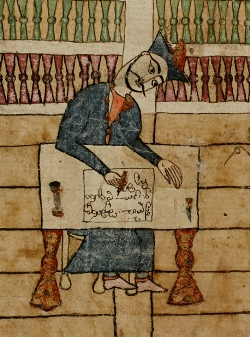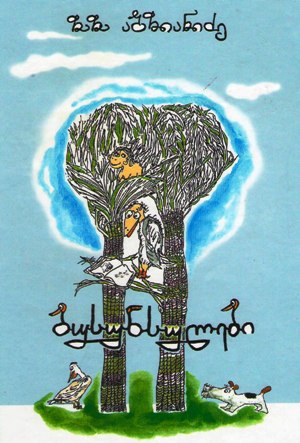

|
The Kartvelologist The Kartvelologist” is a bilingual (Georgian and English) peer-reviewed, academic journal, covering all spheres of Kartvelological scholarship. Along with introducing scholarly novelties in Georgian Studies, it aims at popularization of essays of Georgian researchers on the international level and diffusion of foreign Kartvelological scholarship in Georgian scholarly circles. “The Kartvelologist” issues both in printed and electronic form. In 1993-2009 it came out only in printed form (#1-15). The publisher is the “Centre for Kartvelian Studies” (TSU), financially supported by the “Fund of the Kartvelological School”. In 2011-2013 the journal is financed by Shota Rustaveli National Science Foundation. |
Shota Rustaveli (Encyclopedic Research)
* * * Medieval Georgian culture belongs to the cardinal process of Christian thinking development. It gradually reveals the basic steps of European Christian civilizations. In the late 12th and early 13th centuries, at the highest peak of its development, it represented the newest and the most modern tendencies of Christian thinking of those times. However the highest peak of the medieval Georgian culture is Vepkhistkaosani – The Man in the Panther Skin (MPS) by Rustaveli, being one of the best examples of a synthesis of Eastern and Western cultural streams, literary in particular. At the same time, similar to the whole essence of Georgian religious-philosophical and literary process of those times, it belongs to European Christian civilization. By its artistic actualizing world view and aesthetic ideals of its epoch, MPS is one of the most significant works of world literature.
keywords:Rustaveli, the Man in the Panther Skin, Ramayana, Shakespeare, Dante Category: SCHOLARLY STUDIES Authors: ELGUJA KHINTIBIDZE Georgian Educational and Cultural Center in Montauban (The latest materials)
There was a Georgian Monastery in the vicinity of Paris in the second half of the 19th century. Quite a few scholarly studies have been conducted in order to explore this Georgian centre. This article analyses some newly found facts, based on the materials obtained by the Director of Montauban Municipal Archive - Pascal Leroy, (the study by P. Leroy will be published in the current ssue of The Kartvelologist. keywords:Montauban, Pascal Leroy, Peter Kharischirashvili Category: SCHOLARLY STUDIES Authors: AVTANDIL NIKOLEISHVILI Animalarky
In the past decade Zaza Abzianidze has also become popular as a children’s author. We hope that foreign readers interested in learning modern Georgian will find several poems published here interesting and useful from the point of view of their refined literary style, lexis and parallel English translations. The poems and illustrations are taken from the author’s book “Busunsulebi”, published in 2009, by the Publishing House ‘Pegasi’. The translations are published from the book Zaza Abzianidze, Animalarky, translated by Lyn Coffin. The publication is agreed with the author. The Editor keywords:Animalarky Category: GEORGIAN LITERATURE IN ENGLISH TRANSLATION Authors: Zaza Abzianidze Shota Rustaveli’s Theory of Friendship
The previous article represents the relevance between Aristotelian and Rustvelian concepts of friendship. The author in the MPS focuses on the dynamicity of nature of the protagonist males and defines the changes, revealed through the dynamicity of the features of the characters, based upon the thoughts of a various philosophers. keywords:“The Man in the Panther Skin”, friendship, Aristotle, alter ego Category: SCHOLARLY STUDIES Authors: Bert Beynen
Georgian Educational and Cultural Center in Montauban (The latest materials)
In an attempt to fill in the above mentioned lacuna, along with several Georgian researchers interested in the history of the Montauban Georgian Centre (Z. Chichinadze, Sh. Lomsadze, I. Tabaghua, S. Grigalashvili, M. Javakhishvili) [2], I have also put all my efforts into the search for new information regarding the issue. With the active help of Avtandil Khurtsidze, a specialist of the French language and a staff member of Akaki Tseereteli State University, Department of International Relations, in November 2008, I appealed to the Mayor’s Office of Montauban to help me to obtain specific information regarding the materials stored in The Archives of Ancient Materials in relation to the issues we were interested in. keywords:Montauban, Pascal Leroy, Peter Kharischirashvili Category: SCHOLARLY STUDIES Authors: AVTANDIL NIKOLEISHVILI Ommunaute des Peres Georgiens Catholiques a Montauban de 1872 a 1905
Pascal Lerua, the director of Administrative Center of Tarni and Garon’s Municipal Archives in Montobean, in France, dedicated a special research to the history of Georgian community in Montobean, existing in the 19th century. His interest in the subject, leading to the research, was provoked by the reference made by Professor of Kutaisi State University - Avtandil Nikoleishvili. Due to the fact, Professor Lerua provided Professor A. Nikoleishvili with the hitherto unknown facts based on his scholar research. The previous edition of the Journal releases Lerua’s study along with his personal letters, performed in French. The Georgian translation of the study and the letters has been performed by the colleague of the Kutaisi State University - Avtandil Khurtsidze. The Editor keywords:Montauban monasteries Category: SCHOLARLY STUDIES Authors: Pascal Leroy |
Categories Journal Archive |




 In the present edition of the journal “The Kartvelologist” several children’s rhymes by a famous Georgian literary critic Zaza Abzianidze are published with their parallel translations. Our choice was determined by two factors:
In the present edition of the journal “The Kartvelologist” several children’s rhymes by a famous Georgian literary critic Zaza Abzianidze are published with their parallel translations. Our choice was determined by two factors: